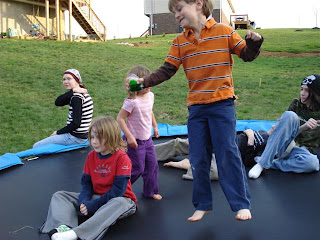At the Always Learning list (Yahoo groups) a newer unschooler had an "aha" moment. She realized that part of the reason she was struggling with trusting her children, was because she had learned to NOT trust herself. That's a big one. I really enjoyed the posts in response and thought I'd share them here. For us, the trust issue applies to everything:
My post in response:
~~How can I learn to trust myself better?~~
This is the KEY question!! Once we realize this and start asking this
question, it really changes the perspective and helps us SEE how we
don't trust our children because we don't trust ourselves.
THAT is a big journey, one I'm still on and probably will be for the
rest of my life. I think I really TRUST myself and believe in my
ability to do most anything. Then something will come along to show me
that there is STILL some shred of doubt, some nagging fear that is
deeply embedded and I question all over again.
That's one of my favorite John Holt quotes: "To trust children we must
first learn to trust ourselves...and most of us were taught as
children that we could not be trusted."
The main lesson that schools and adults left us with is that we can
NOT be trusted. We must be taught. We must trust the experts. We are
left devoid of a true connection with our powerful inner voice. In
regaining that connection, we can truly honor and trust our children.
Ren
learninginfreedom.com
~~~~~~~~~~~~~~~~~~~~~~~~~~~~~~~~~~~~~~~~~~~~~~~~~~~
Joanna Murphy's response:
Just yesterday a friend and I were discussing what we thought
of as a distilling "factor" that must be present for unschooling/mindful
parenting to be successful. The factor that came up was TRUST.
With trust, the world opens up, horizons expand and life can
seem exciting and limitless. Without trust, the world shuts down,
gets narrow and petty. Each moment matters in the wrong way.
I want more expansiveness in my life, not
less.
And the expansive quality of trust grows out from the center
to touch every part of our lives. Trust that we ARE capable
and that we will, through our honest endeavor,
figure out a way. Trust that our children will find, ask or
be provided with what they need, trust that
they are in connection with us by their own choosing and
free will--not through "enforcing." And trust that they will
grow up loving and caring and interesting people
without being "taught."
Joanna
~~~~~~~~~~~~~~~~~~~~~~~~~~~~~~~~~~~~~~~~~~~~~~~
Sandra Dodd's response:
-=-Without trust, the world shuts down, gets narrow and petty. Each
moment matters in the wrong way. I want more expansiveness in my
life, not less.-=-
I was going to add that whole post to my "trust" page, and DOH!
No trust page. There is the beginning of one now.
http://sandradodd.com/trustI like this: "And the expansive quality of trust grows out from the
center to touch every part of our lives. Trust that we ARE capable
and that we will, through our honest endeavor, figure out a way. "
I liked all of it. I don't like to think of trusting in a person. I
like to think of trusting in the process of learning, and trust in
the benefit of living by principles. It can get back to the people.
There are two problems I've seen with "trust" when people think it
means "trust" blindly, or trust without effort.
First problem: Some people want to trust that their kids will learn
just because they left them alone and peeked in once in a while. And
I've often heard someone defend such laxness with "Anything's better
than school" which is a cop-out and a defense of the listless and lazy.
And some people hear us talking about "trust yourself" and they have
no clear idea what that means, but they decide to "trust themselves"
even though every few days they're getting out a curriculum, and
they're yelling at their kids or waiting for them to "develop a
primary interest." Just waiting.
The second problem is bigger for some people and nothing to others.
It has to do with heresy. Not social heresy or school heresy,
Christian heresy.
It's humanism.
To say that a person can be trusted to unfold in peace and goodness
is plain old heresy. And it's the reason some Christians say that
other Christians can't be unschoolers, or that unschooling itself is
un- or anti-Christian.
Sandra































